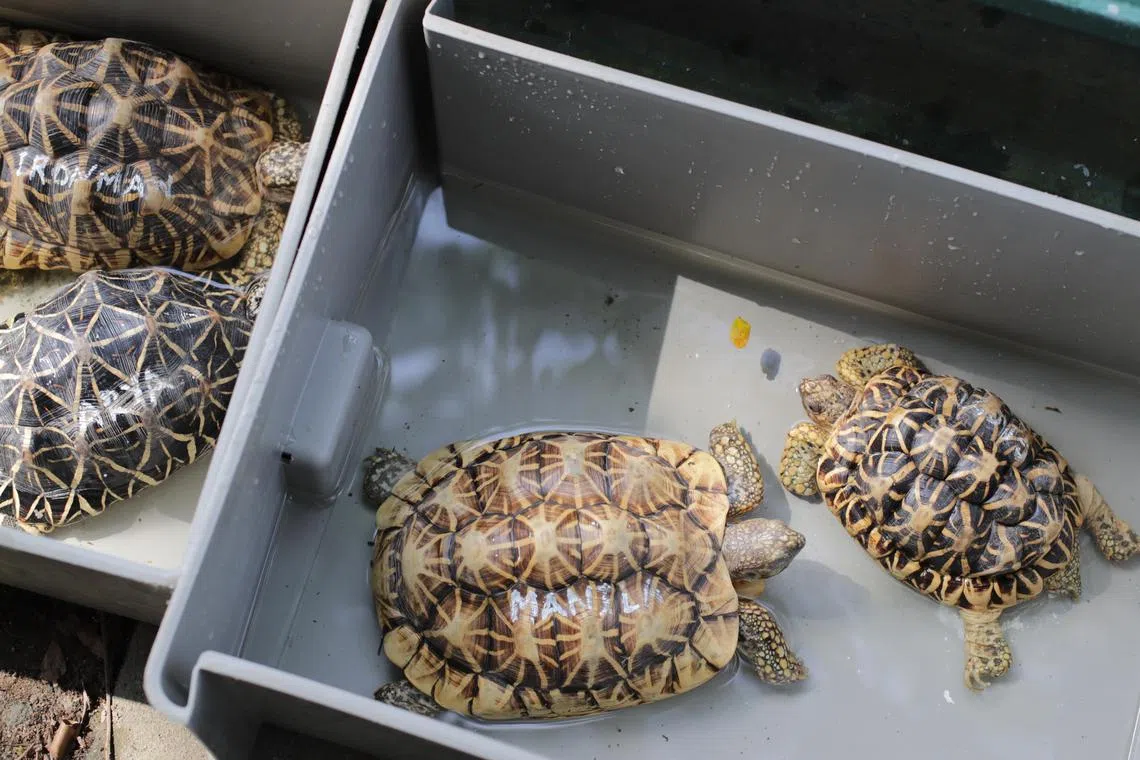Illegal wildlife trade detected on Telegram doubled from 2021 to 2023: Acres
Sign up now: Get ST's newsletters delivered to your inbox

Indian star tortoises (above), leopard tortoises and scorpions were among wildlife that faced the greatest increase in demand in Telegram groups tracked.
ST PHOTO: GIN TAY
SINGAPORE - The illegal wildlife market in Singapore flourished on Telegram over the past three years despite enforcement action taken against sellers, the Animal Concerns Research and Education Society (Acres) has found.
The number of banned wild animals that Acres found for sale on the messaging platform almost doubled from 333 in 2021 to 660 in 2023, according to the charity’s report released in December. The number of sellers offering prohibited wildlife for sale also rose from 66 in 2021 to 387 in 2023.
Indian star tortoises, leopard tortoises and scorpions were among wildlife that saw the greatest increase in demand among Telegram groups tracked.
For instance, advertisements for the most popular animal, the Indian star tortoise, grew from just four in 2021 to 21 in 2023. This came despite heftier fines and jail terms faced by those trading the species in Singapore
Across the world, commercial sales of the reptiles – named after their striking star-patterned shells – have been banned, but they continue to be sought after as pets.
Prohibited wildlife had price tags ranging from $10 to about $3,000 on these platforms.
In compiling the report, Acres co-chief executive Anbarasi Boopal said the charity compared messages exchanged over 61 days on the three largest groups illegally peddling wildlife in 2021 against those of the three biggest groups in 2023.
The charity chose to investigate Telegram, as reports from the public and Acres’ surveillance of these groups showed that the messaging service had become a hub for the illicit animal trade.
Ms Anbarasi said Acres alerted the authorities about the issue in 2021. The charity was told that the authorities were monitoring and taking action against these groups.
“The second surveillance was meant to see if these efforts had any effect, and whether more needed to be done in regulating online platforms,” she said.
Acres found that some sellers were aware that the authorities were monitoring these groups, yet known offenders continued to participate in them by sharing information on raids.
The report said: “Some users openly shared that their houses have been raided before, alerting the others to stay alert for a few days.”
Checks by The Straits Times found that sellers often flagged and weeded out potential snitches.
Members of these groups would also make requests to smuggle prohibited wild animals into Singapore.
In November, ST reported that buyers can pay for such delivery services from Malaysia,
The sellers appear undeterred by stiffer penalties for the illegal trade of wildlife protected under the Convention on International Trade in Endangered Species of Wild Fauna and Flora (Cites). The report found that the number of Cites-listed wild animals listed for sale in Telegram groups had nearly doubled from 84 in 2021 to 165 in 2023.
In 2022, the maximum jail term for individuals involved in the illegal wildlife trade tripled from two years to six, while the new maximum fine increased from $50,000 per species to $100,000 per specimen.
Responding to queries on the report, the National Parks Board (NParks) said that it searched more than 50 premises across the island involving people who had advertised wildlife species for sale on social media platforms like Telegram from 2021 to 2022.
This led to the seizure of over 180 wild animals, including several species protected under Cites, said NParks director for wildlife trade Anna Wong.
But investigations into cases involving the online sale of animals are often complex, she added.
Common challenges faced by the authorities include a lack of direct evidence, sellers operating anonymously and buyers’ reluctance to step forward as witnesses, she said.
Tech firms, including TikTok, have joined an anti-wildlife trafficking coalition that has blocked or removed over 11 million listings related to illegal wildlife, but Telegram is not one of them, the report noted.
According to Telegram’s website, chats among participants on the messaging platform are private, so it does not process any requests related to illegal content in these messages.
Citing the gaps in relying on online platforms to self-regulate and the time-sensitive nature of enforcing against illegal wildlife trade, Acres’ report recommended legislation that can compel platforms to take action against offences related to biodiversity or animal welfare on its services.
Dr Wong called on the public to ensure that their purchases do not contain animal parts of endangered species and that they are not contributing to the demand for the illegal trade of wildlife.
Members of the public can contact NParks at cites@nparks.gov.sg
Dr Wong said: “Information shared will be kept strictly confidential.”



